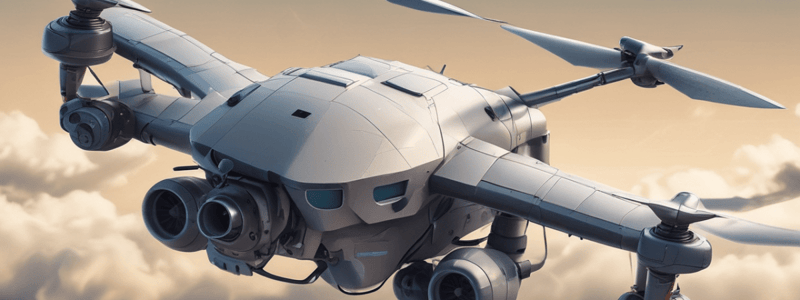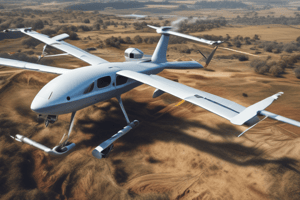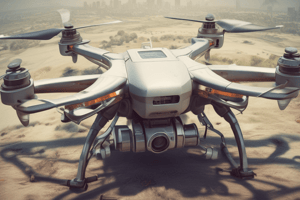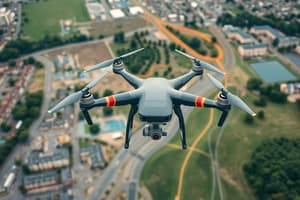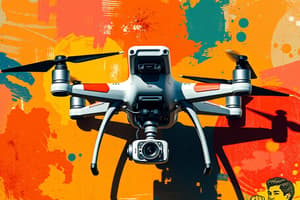Podcast
Questions and Answers
What type of SD card is recommended for use in the drone?
What type of SD card is recommended for use in the drone?
- SanDisk Extreme Pro SD card (128GB or 256GB) (correct)
- SanDisk Ultra SD card (64GB or 128GB)
- Lexar Professional SD card (128GB or 256GB)
- Samsung EVO SD card (64GB or 128GB)
What should you avoid when taking off with the drone?
What should you avoid when taking off with the drone?
- Glass and mirrors
- Water and humid environments
- Trees and power lines
- Magnetic and metal materials (correct)
What is the recommended minimum battery voltage for a healthy battery?
What is the recommended minimum battery voltage for a healthy battery?
- 3.70V
- 3.60V (correct)
- 3.50V
- 3.40V
What flight mode allows for faster motions and more dynamic shots?
What flight mode allows for faster motions and more dynamic shots?
What is the purpose of adjusting gimbal settings in sport mode?
What is the purpose of adjusting gimbal settings in sport mode?
What type of filter can enhance the quality of your shots?
What type of filter can enhance the quality of your shots?
What should you avoid when powering on the drone?
What should you avoid when powering on the drone?
How often should you replace drone batteries?
How often should you replace drone batteries?
What is the effect of using the dolly zoom technique?
What is the effect of using the dolly zoom technique?
The remote controller should be fully charged before flight.
The remote controller should be fully charged before flight.
Metal materials are suitable surfaces for takeoff.
Metal materials are suitable surfaces for takeoff.
Gimbal settings can be adjusted in normal mode.
Gimbal settings can be adjusted in normal mode.
The dolly zoom technique creates a slow and static shot.
The dolly zoom technique creates a slow and static shot.
It's recommended to replace drone batteries every year.
It's recommended to replace drone batteries every year.
Study Notes
Pre-Flight Checklist
- Ensure remote is fully charged
- Ensure batteries are fully charged
- Choose a good airspace spot, avoiding obstacles like trees and power lines
- Use a SanDisk extreme Pro SD card (128GB or 256GB)
Takeoff and Initial Checks
- Take off from a flat surface, avoiding magnetic and metal materials
- Perform a control sweep to ensure drone is reacting properly
- Check battery voltage to ensure it's above 3.60V (indicative of a healthy battery)
Flight Modes and Settings
- Normal mode is suitable for most flights
- Sport mode allows for faster motions and more dynamic shots
- Adjust gimbal settings in sport mode to control tilt speed (gain and Expo tuning)
Video Shooting Techniques
- Use a simple slide motion to create a smooth shot
- Tilt up and pitch forward to create a reveal shot
- Add complexity to shots by combining movements (e.g., tilt, pitch, and yaw)
- Use sport mode to cover more ground and create faster motions
- Use the right dial to zoom in and out while flying
Dolly Zoom Technique
- Zoom in while pitching forward, then slowly zoom out as flying forward
- Creates a dynamic and engaging shot
- Can be used in vertical mode for social media and short-form video
Additional Tips
- Use an ND filter to achieve better shots
- Avoid powering on the drone with the gimbal clamp on, as it can ruin the gimbal
- Monitor battery health and replace batteries after 2 years or when voltage drops below 3.60V
Pre-Flight Preparation
- Ensure remote control is fully charged before flight
- Fully charge drone batteries to prevent mid-flight power loss
- Choose a safe and obstacle-free airspace spot, avoiding trees and power lines
- Use a recommended SanDisk extreme Pro SD card with a minimum capacity of 128GB or 256GB
Initial Flight Checks
- Take off from a flat surface to prevent magnetic and metal interference
- Perform a control sweep to test drone's reaction to commands
- Check battery voltage, ensuring it's above 3.60V for a healthy battery
Flight Modes
- Normal mode suits most flight scenarios and provides stable footage
- Sport mode enables faster motions and more dynamic shots, ideal for experienced users
- Adjust gimbal settings in sport mode to control tilt speed using gain and Expo tuning
Video Capture Techniques
- Use a simple slide motion to create smooth and cinematic shots
- Tilt up and pitch forward to reveal subjects or landscapes
- Combine movements (tilt, pitch, and yaw) for more complex and engaging shots
- Utilize sport mode to cover larger areas and capture faster motions
- Adjust zoom using the right dial while flying for added control
Dolly Zoom Technique
- Zoom in while pitching forward, then slowly zoom out while flying forward for a dynamic effect
- Creates an engaging and professional-looking shot
- Can be adapted for vertical mode, ideal for social media and short-form video content
Additional Tips and Safety Reminders
- Use an ND filter to achieve better exposure and reduce unwanted light
- Avoid powering on the drone with the gimbal clamp on to prevent gimbal damage
- Regularly monitor battery health and replace batteries every 2 years or when voltage drops below 3.60V
Pre-Flight Preparation
- Ensure remote control is fully charged before flight
- Fully charge drone batteries to prevent mid-flight power loss
- Choose a safe and obstacle-free airspace spot, avoiding trees and power lines
- Use a recommended SanDisk extreme Pro SD card with a minimum capacity of 128GB or 256GB
Initial Flight Checks
- Take off from a flat surface to prevent magnetic and metal interference
- Perform a control sweep to test drone's reaction to commands
- Check battery voltage, ensuring it's above 3.60V for a healthy battery
Flight Modes
- Normal mode suits most flight scenarios and provides stable footage
- Sport mode enables faster motions and more dynamic shots, ideal for experienced users
- Adjust gimbal settings in sport mode to control tilt speed using gain and Expo tuning
Video Capture Techniques
- Use a simple slide motion to create smooth and cinematic shots
- Tilt up and pitch forward to reveal subjects or landscapes
- Combine movements (tilt, pitch, and yaw) for more complex and engaging shots
- Utilize sport mode to cover larger areas and capture faster motions
- Adjust zoom using the right dial while flying for added control
Dolly Zoom Technique
- Zoom in while pitching forward, then slowly zoom out while flying forward for a dynamic effect
- Creates an engaging and professional-looking shot
- Can be adapted for vertical mode, ideal for social media and short-form video content
Additional Tips and Safety Reminders
- Use an ND filter to achieve better exposure and reduce unwanted light
- Avoid powering on the drone with the gimbal clamp on to prevent gimbal damage
- Regularly monitor battery health and replace batteries every 2 years or when voltage drops below 3.60V
Studying That Suits You
Use AI to generate personalized quizzes and flashcards to suit your learning preferences.
Description
Learn about the essential pre-flight checks and initial procedures to ensure a safe and successful drone flight. This quiz covers important steps to follow before and after taking off.
